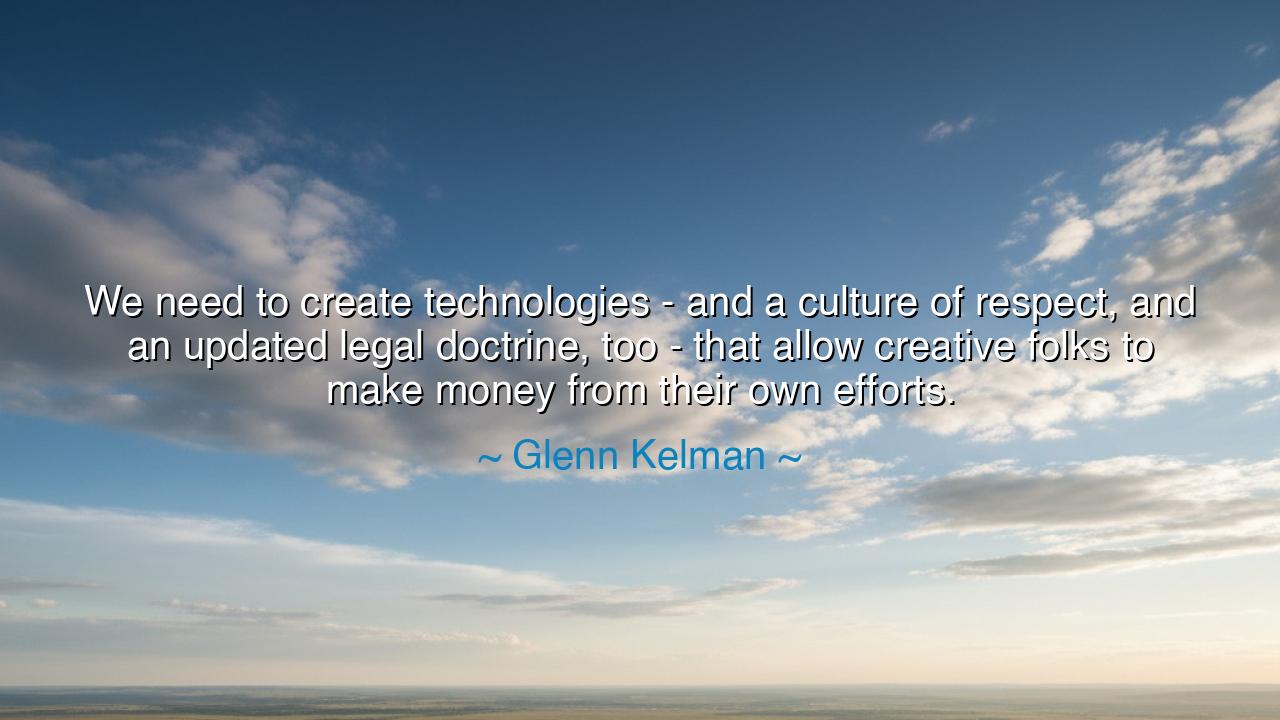
We need to create technologies - and a culture of respect, and an
We need to create technologies - and a culture of respect, and an updated legal doctrine, too - that allow creative folks to make money from their own efforts.






"We need to create technologies – and a culture of respect, and an updated legal doctrine, too – that allow creative folks to make money from their own efforts." Thus spoke Glenn Kelman, leader in the realm of technology and innovation, his words echoing with both urgency and vision. He reminds us that the soul of civilization has always depended on its creators—the artists, the thinkers, the inventors, the builders of words, images, and machines. Yet too often, these visionaries labor in brilliance while others seize the fruits of their efforts. Kelman declares that it is not enough to admire creativity; we must build systems, cultures, and laws that protect it and allow its stewards to thrive.
The origin of this wisdom lies in the age-old tension between creation and exploitation. From the first scribes who copied manuscripts without credit, to modern corporations that profit from digital art without paying its authors, the struggle has remained the same: how do we ensure that those who give birth to ideas are not left impoverished while others grow rich from their genius? Kelman points to three pillars of protection—technology, respect, and law—as the triad upon which justice for creators must be built.
Consider the story of Nikola Tesla, one of history’s greatest inventors. His mind crackled with ideas that would shape the modern world—alternating current, wireless communication, electric power. Yet though his inventions lit cities, he died in poverty, his brilliance exploited by men of business who understood profit better than principle. Tesla’s fate is the eternal warning: without legal doctrine that safeguards the rights of creators, without a culture of respect for innovation, and without technologies that ensure fair distribution, genius can be stolen, leaving its bearer forgotten.
Kelman’s words also strike a heroic chord in this age of digital abundance. Today, musicians, writers, programmers, and artists release their work into a world where it can be copied endlessly with the click of a button. While this allows their art to spread further than ever before, it also means their labor is often consumed without compensation. Platforms grow wealthy while the hands that shape the content struggle to survive. Here we see the pressing need for updated legal doctrines—laws that understand the digital age, laws that ensure creative folks are not cast aside as free fuel for corporations.
Yet law and technology alone are not enough. Kelman calls also for a culture of respect—a society that honors the creator, not just the product. For what good are laws if the people themselves treat art as disposable? Respect means teaching children to value books, music, and inventions not as mere commodities, but as pieces of the human spirit made tangible. It means supporting artists, not with empty praise, but with fair payment and recognition. Only when society itself esteems the act of creation will the laws and tools we build truly serve justice.
The lesson for us is profound: creation is sacred, and those who create must be sustained. A society that exploits its inventors and artists may achieve wealth for a moment, but it will bleed dry the very source of its vitality. A society that protects and empowers them, however, will flourish with innovation, beauty, and progress. Kelman’s vision is not only about fairness but about survival—for if the creative spirit is not nourished, the future itself is impoverished.
What practical steps must we take? Support creators by paying for their work, not pirating it. Advocate for laws that ensure fair compensation in the digital age. Use technology to build systems—like secure distribution platforms, fair contracts, and transparent revenue sharing—that give artists their rightful due. And most importantly, cultivate in ourselves and in our children a culture of respect for those who dare to create.
So let Glenn Kelman’s words resound as both prophecy and command: to protect creators is to protect civilization itself. Build the technologies, nurture the respect, and forge the laws that allow every artist, every inventor, every dreamer to live by the fruits of their own labor. For in their survival lies the endurance of our culture, and in their prosperity lies the future of humankind.






AAdministratorAdministrator
Welcome, honored guests. Please leave a comment, we will respond soon